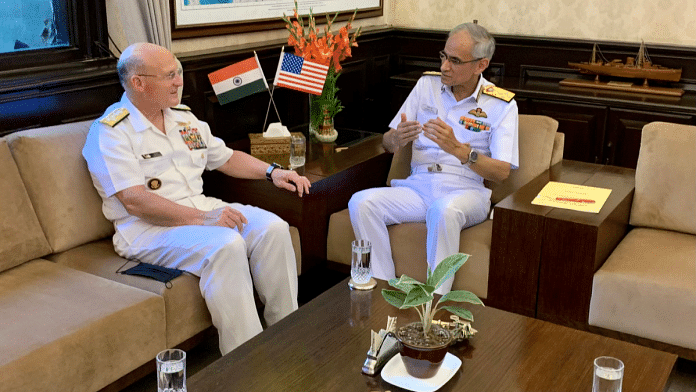New Delhi: The expansion of the Malabar naval exercise in the future is a possibility though any decision on it will have to be taken by the four Quad member countries, Chief of US Naval Operations Admiral Michael Gilday said on Tuesday.
Admiral Gilday, on a five-day visit to India from October 11 to 15, described the strategic ties between India and the US as “central” to a free and open Indo-Pacific, noting that there is much to “celebrate” in the relationship.
His comments on the possible expansion of the scope of the Malabar drills in the future came on a day the second phase of the mega naval wargame among all four Quad countries — India, the US, Australia and Japan — kicked off in the Bay of Bengal.
“In the future sure, that exercise could expand. I think it is up to the partners inside the Quad to discuss that. But remember there are multiple exercises that go on in the Indo Pacific and globally every year where the like-minded allies and partners work together,” Admiral Gilday told a small group of reporters at an online briefing.
He was replying to a question on whether there is a possibility of countries like the UK joining the mega naval wargame in the future.
On Tuesday, the Chief of US Naval Operations held extensive talks with Navy Chief Admiral Karambir Singh, Chief of Defence Staff Gen Bipin Rawat and Foreign Secretary Harsh Vardhan Shringla with a focus on boosting overall bilateral maritime security cooperation.
“We are committed to operationalizing our #USIndiaDefense partnership, including through enhanced information-sharing, regional security, and exercising at sea together,” Admiral Gilday tweeted after talks with Admiral Singh.
Admiral Gilday’s visit to India came amid increasing concerns over the growing Chinese muscle-flexing in key waterways including the Indo-Pacific.
“I am confident that together we can build a partnership that is fit for today and tomorrow’s challenges,” he said.
Asked whether the trilateral AUKUS security alliance will dilute the strategic significance of the Quad, the top American naval commander did not give a direct reply but said there has been a “natural partnership” between the US and India and that both countries are bound by shared values of promoting a free and open maritime domain, regional stability, ensuring rule of law and respect for international institutions.
In this context, he also mentioned the threat of global authoritarianism and how India and the US have a long, healthy and positive relationship.
“India is one of our close strategic partners and our relationship is central to a free and open Indo-Pacific,” he said.
The AUKUS (Australia, the UK and the US) partnership was unveiled by US President Joe Biden, Australian Prime Minister Scott Morrison and British PM Boris Johnson last month.
Admiral Gilday said his talks in India primarily focused on the Indian Ocean which he said is a strategically important waterway that is not only important for Asia but for the entire world.
To a specific question on bilateral naval cooperation, he said both India and the US use each other’s ports, air fields and refuelling capabilities for ships and cooperation is getting stronger.
On China’s expansion of its naval prowess, he said the trajectory of the Chinese investment has been strong adding the US is also strengthening its capabilities.
He said the US’s naval presence in the Indo-Pacific is a testimony to its capabilities and that it has the “asymmetric” advantage along with its partners and allies globally.
Also read: Nirmala Sitharaman meets leaders of global corporations in US, discusses reforms in India






